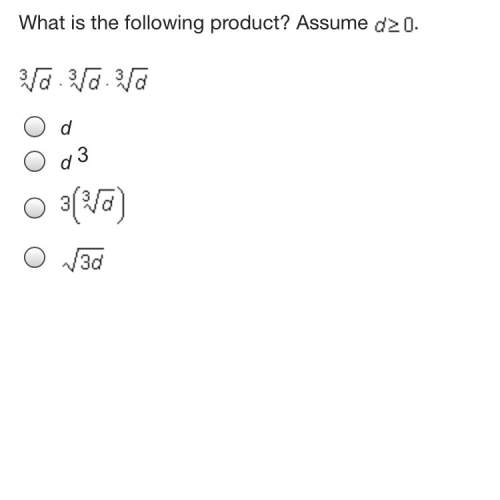What is the following product? assume d> /= 0
...

Mathematics, 17.10.2019 04:50 nya95
What is the following product? assume d> /= 0


Answers: 3


Other questions on the subject: Mathematics

Mathematics, 21.06.2019 15:00, cal1805p8uo38
Aregular hexagon rotates counterclockwise about its center. it turns through angles greater than 0° and less than or equal to 360°. at how many different angles will the hexagon map onto itself?
Answers: 2

Mathematics, 21.06.2019 17:00, yannabby26
The accompanying table shows the numbers of male and female students in a particular country who received bachelor's degrees in business in a recent year. complete parts (a) and (b) below. business degrees nonbusiness degrees total male 189131 634650 823781 female 169539 885329 1054868 total 358670 1519979 1878649 (a) find the probability that a randomly selected student is male, given that the student received a business degree. the probability that a randomly selected student is male, given that the student received a business degree, is nothing. (round to three decimal places as needed.) (b) find the probability that a randomly selected student received a business degree, given that the student is female. the probability that a randomly selected student received a business degree, given that the student is female, is nothing. (round to three decimal places as needed.)
Answers: 2

Mathematics, 21.06.2019 18:00, briseidam6683
Suppose sat writing scores are normally distributed with a mean of 497 and a standard deviation of 109. a university plans to award scholarships to students whose scores are in the top 2%. what is the minimum score required for the scholarship? round your answer to the nearest whole number, if necessary.
Answers: 2

Mathematics, 21.06.2019 19:00, Olavarriafamily1
The figures below are made out of circles, semicircles, quarter circles, and a square. find the area and the perimeter of each figure and give your answers as a completely simplified exact value in terms of π (no approximations).
Answers: 1
You know the right answer?
Questions in other subjects:

Biology, 03.02.2020 02:48

History, 03.02.2020 02:48

Chemistry, 03.02.2020 02:48

Mathematics, 03.02.2020 02:48



Mathematics, 03.02.2020 02:48



![\boxed{\boxed{\sqrt[3]{d}\cdot \sqrt[3]{d}\cdot \sqrt[3]{d}=d}}](/tpl/images/0327/3508/ebd9f.png)
![=\sqrt[3]{d}\cdot \sqrt[3]{d}\cdot \sqrt[3]{d}](/tpl/images/0327/3508/32cca.png)








